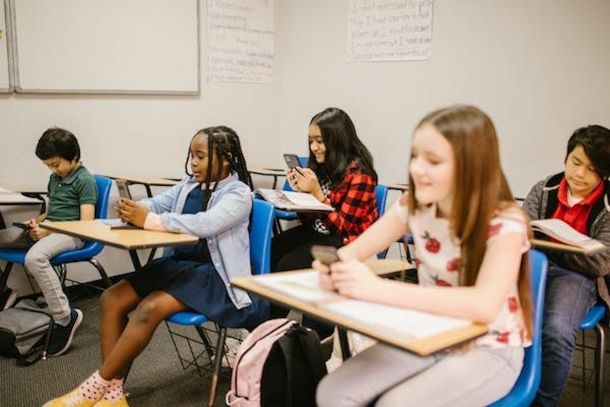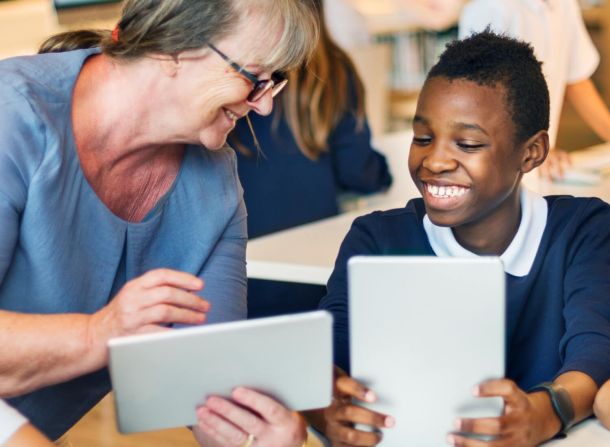
Education trends in GCC countries: Over 1000 new schools, a 1.5% technology-driven growth by 2027
The most recent Alpen Capital report on the growth trends in education in the GCC countries shows that the integration of technology in this sector, along other factors, fueled its constant growth in the post-COVID era. Consequently, technology-focused education will play an even higher part in the near future, to create an academic ecosystem aligned with international standards and to attract significant investments.
Education across GCC countries:
+1000 new schools to open by 2027
The GCC region, which comprises Saudi Arabia, the UAE, Oman, Kuwait, Bahrain and Qatar, is currently a highly competitive market for all education investors and the predictions are similarly encouraging.
The results of the research published in the Alpen Capital report are corroborated by consultancy company ISC Research. Their most recent research shows that over the past 10 years, the global education market has soared by 50% in areas such as number of schools, number of enrolled students, teaching staff and income generated by tuition fees. Asia champions this sector, with an impressive 4.2 million students registered in international schools in the K12 segment. The Middle East market has seen the same positive trend, with growth tendencies in the mentioned areas varying between 8 and 14%. In this context, the fact that the top five schools in the world are located in Asia (in China, India, UAE, Indonesia and Pakistan respectively), comes as no surprise.
“GCC is home to a growing base of young population, with the percentage of population under the age of 25 ranging from approximately 25% in Qatar to 50% in Oman” the Alpen Capital report shows. According to ISC Research, Dubai’s population is expected to double in the next 20 years.
Technology and support for private initiatives, among the main factors
Thus, the positive education trends we're witnessing in the GCC countries are a direct result of a growing school age population. Other factors include technology-driven education strategies, the influx of private school operators, and favourable authority policies and guidelines. The market stays attractive for education investors given the low-tax environment and high financial autonomy they enjoy.
Amidst these trends, local governments have been supporting privatisation initiatives to support quality education. This roughly translates into the inauguration of hundreds of new schools, all seen as opportunistic ways to develop profitable businesses.
Over 1000 new schools will open in the next 4 to 5 years, given the great number of incoming expats, the Alpen Capital report shows. In this context, for instance, the number of schools in the UAE is expected to grow by 50%. In fact, the region is welcoming more expats than ever before, most of them Chinese, Ukrainian or Russian.
The public school sector will remain dominant, although it will grow at a slower rate – 0.4%. On the other hand, studies estimate a 1.5% increase in demand for new schools in the private sector and an influx of private operators. Country-wise, we should see the most significant growth in Saudi Arabia.
Thanks to the growing awareness among nationals, schools have started to adopt a broader curriculum to meet the demands for a more holistic approach to learning. Hence the adoption of international educational frameworks (British, American and International Baccalaureate curricula especially), also favoured by the fact that foreign colleges and universities (especially from the UK and the US) have started to establish branches in GCC countries.
With this comes the need for teachers, parents, and leaders to ensure the best teaching standards for all school levels. This also entails a huge demand for resources, services and technology, continuous professional development, recruitments and resources to support well-being in the education sector.
In line with the prevailing education trends in the GCC countries, Kinderpedia offers an all-in-one school management system tailored for the K12 segment. Kinderpedia's comprehensive platform addresses the pressing need for efficient educational management. By seamlessly integrating administrative tasks, efficient reporting, transparent communication, curriculum planning, and resource sharing, Kinderpedia empowers school leaders to navigate the dynamic landscape of the GCC education sector.
In a context where the demand for quality education resources, services, and technology is burgeoning, Kinderpedia not only streamlines school management but also supports the professional development and well-being of educators and students alike, making it a pivotal asset for schools nowadays.
The impact of technology-driven education in GCC countries
“The growing adoption of technology and ramping up of investments in digitally aided platforms has helped boost the quality of education in the region”, the Alpen Capital report mentions. Technology integration has not only helped the regional governments and institutions to optimise operations and innovate for the overall development of the GCC education ecosystem, but also further open up the sector for higher growth and investment opportunities.
“The GCC education industry has witnessed significant transformation, with a focus on providing quality education and promoting technological advancement. Integration of technology has been a key development in the region, with educational institutions incorporating advanced technologies like virtual classrooms, e-learning platforms, and mobile apps to make education more accessible and efficient.[…] The integration of technology in the education sector has also made the learning process more interactive and engaging. Online education allows for self-paced learning, while offline facilities provide practical exposure. This combination has enhanced learning outcomes and the overall educational experience.” says Kamal Puri, chairman of Skyline University College, UAE.
The adoption of digital was initially linked to the pandemic. Since then, digital strategies have evolved to be linked with the curriculum. What the market sees now is how technology advanced from being just classroom consideration to its incorporation in the broader school ecosystem to support social and emotional well-being, reduce staff workload, and speed up feedback load, industry experts say.
Kai Vacher, Principal of the British School Muscat and British School Salalah, expressed the same idea ina recent webinar hosted by Kinderpedia.
”Schools are digital ecosystems. There is so much technology in our schools today and I believe we really need to think about how we lead and manage all this technology in a way that is a supportive ecosystem for the growth of our young people and for the growth of our colleagues and our community” he said.
Kinderpedia is a complete school software that brings a modern and user-friendly touch to classroom management and curriculum planning. With features designed for school staff, students, and families alike, it offers real-time feedback, progress tracking, collaborative learning functionalities, whilst encouraging all parties to play an active role in this academic journey.
👉 Learn how Kinderpedia supports active learning and the transition to a modern classroom
The markets in the region are now seeking a more consolidated view on the use of technology, industry experts agree. After the pandemic, when everybody used whatever they had at hand, the trend now is to align everybody in terms of use and tools.
This raises the question of what technology schools are willing to implement. The tendency has been to use the best product and usually the best product was considered the one with the most features. What matters even more now is the product's scalability and its ability to integrate with other systems to allow one to save duplicating or triplicating student data and information. Moreover, ease of use in terms of how everybody understands and uses the product efficiently, and how support and training is provided, are equally important.
How AI-based tools are expected to impact education trends across GCC
At the same time, the industry in the region is witnessing a higher adoption of AI-based tools that ensure content, digital libraries, soft skill development, and real-time scenario engagements. Saudi Arabia and the UAE have been massively investing in AI technology. “As part of its Vision 2030 programme, the Kingdom plans to train 20,000 data and AI specialists by 2030 to support its goals in the field” Alpen Capital report mentions.
A notable detail comes from Bahrain. The country ranked first in national female e-inclusion policies, female digital skills training and science, technology, engineering, and maths (STEM) education in META’s 2022 ‘Inclusive Internet Index’.
In fact, STEM education is becoming increasingly important for all countries in the GCC. STEM activitiesin early education stimulate inquiry-based learning, problem solving and critical thinking. The adoption of the STEM framework in school curricula aims to deepen students’ understanding of critical concepts, paving the way for a more skill-based and specialised workforce.
To build a skilled workforce in all necessary industries that will contribute to economic development in the future, GCC governments encourage the recognition of academic excellence. This helps reduce outbound mobility and retain students throughout their formation and beyond, to work in the region. The broader aim is an organic growth of the wealthy population, that in turn will lead to a greater economic stability and an even more profitable private school sector.
In this respect, the pre-primary and tertiary segments are expected to grow faster than the others, by 2.2% and 1.7% respectively, until 2027. K-12 enrolments in the region are expected to grow at a CAGR of 1.5%, to reach 11.7 million by 2027. Favourable factors that foster this previsions stay increasing demand, affordability, and an enabling environment, fiscal stimulus strategies, and overall positive business. The use of technology over all key economic sectors is likely to increase trust and build a sustainable economic environment, the Alpen Capital report concludes.
Employing innovative technology, Kinderpedia helps schools and kindergartens thrive in their mission to shape tomorrow’s adults. Or, as our users say, when schools have a hard time sharing their vision to families, Kinderpedia steps in with transparent communication functionalities and easy-to-use modules. This way, not only does the platform allow students and families to become actively engaged in a learning process that is relevant for their needs, but it also simplifies administrative and classroom management tasks.
The Kinderpedia community currently counts over 2000 schools in 25 countries, the UAE included. So, if you're an education leader looking to drive positive change in your school, consider Kinderpedia as your tech partner.
Book a Demo

Kinderpedia
The complete communication and management solution for schools and childcare centres.
Simplifies teachers' work and brings parents closer to their children's school progress.
Recommended articles
Want to improve your center quality? Kinderpedia is here to help! Not only do we provide thousands of informational content pieces like blog posts, podcasts, webinars and more, we are also makers of the #1 Rated and Reviewed Childcare Software.







